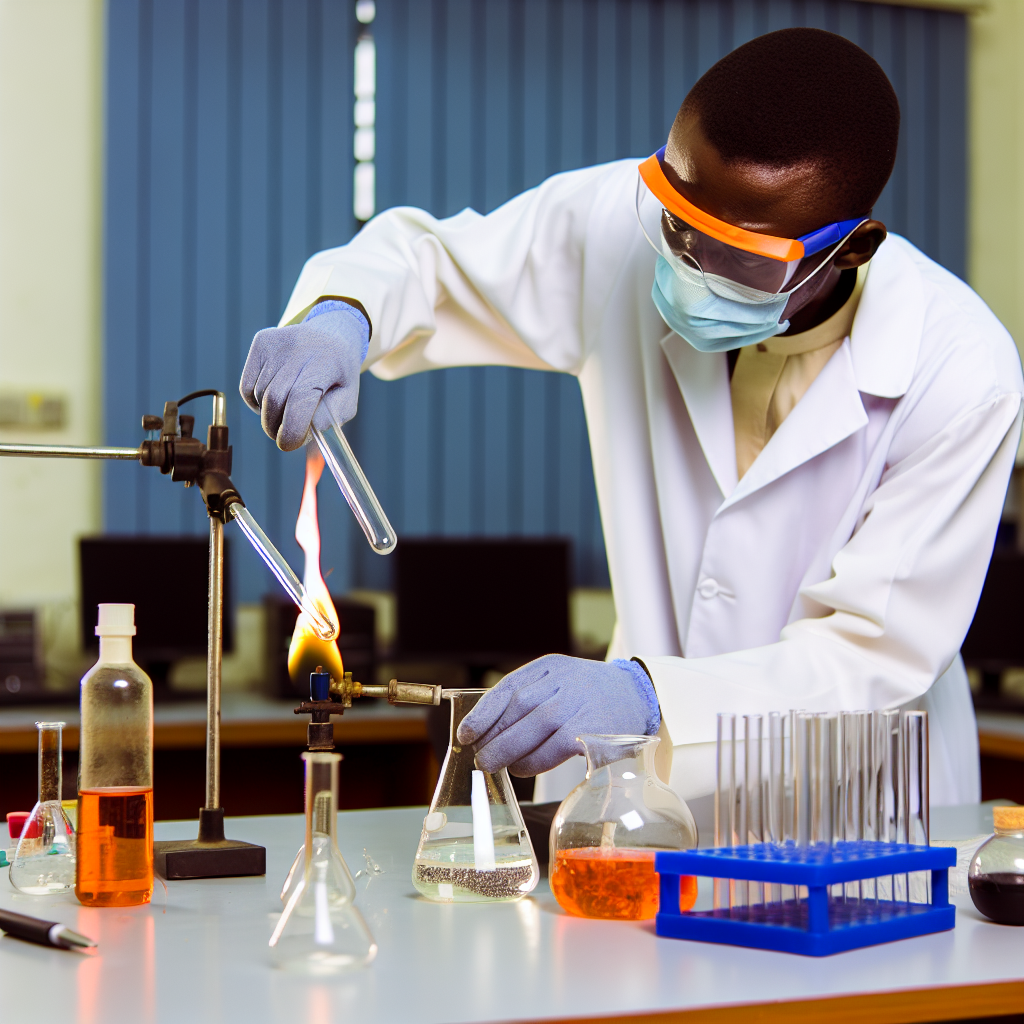Introduction:
Chemistry is a diverse field of study that involves the composition, structure, properties, and reactions of matter.
It plays a crucial role in various industries, including pharmaceuticals, manufacturing, agriculture, and environmental science.
Brief Overview of Chemistry:
Chemistry is the central science that bridges other natural sciences like physics, biology, and geology.
It helps us understand the world at the molecular level and provides solutions to many real-world problems.
Importance of Understanding Key Differences:
It is essential to distinguish between applied chemistry and pure chemistry to comprehend their distinct roles in research and development.
While pure chemistry focuses on fundamental scientific principles and theories, applied chemistry applies these principles to solve practical problems in industries.
Definition and Scope of Pure Chemistry:
When it comes to chemistry, pure chemistry is a key branch that focuses on the theoretical aspects of the science.
It delves into the fundamental concepts and principles that govern chemical processes and interactions.
In pure chemistry, the emphasis is on understanding the nature of matter at its most basic level.
This involves exploring the properties, composition, and behavior of substances without necessarily considering their practical applications.
Areas of Study in Pure Chemistry:
- Inorganic Chemistry: This branch of pure chemistry deals with the study of inorganic compounds, which include minerals, metals, and nonmetals.
- Physical Chemistry: Physical chemistry focuses on the study of the physical properties and behavior of matter, as well as the energy changes that accompany chemical reactions.
- Analytical Chemistry: Analytical chemistry is concerned with the identification and quantification of substances present in a sample, using various instrumental and analytical techniques.
These areas of study in pure chemistry provide a solid foundation for understanding the underlying principles of chemical phenomena.
By exploring the theoretical aspects of chemistry, researchers can deepen their knowledge of the molecular world.
Applied Chemistry vs Pure Chemistry: Key Differences
Applied chemistry is a branch of chemistry that focuses on practical applications in various industries and sectors.
It involves the utilization of chemical principles to solve real-world problems and enhance processes.
Explanation of applied chemistry as a branch of chemistry focused on practical applications:
Applied chemistry is concerned with the direct application of chemical knowledge to address specific challenges and optimize outcomes.
It bridges the gap between theoretical concepts and their implementation in everyday scenarios.
Examples of areas of study in applied chemistry:
- Environmental Chemistry: Involves studying the impact of chemical substances on the environment and developing solutions for pollution control and remediation.
- Medicinal Chemistry: Focuses on the design and synthesis of pharmaceutical compounds to treat diseases and improve healthcare outcomes.
- Materials Science: Explores the properties and applications of various materials for technological advancements in fields such as electronics, aerospace, and construction.
Applied chemistry plays a crucial role in advancing technology, improving healthcare, and protecting the environment.
It encompasses a wide range of disciplines and applications, making it a dynamic and versatile field of study.
See Related Content: Economic Benefits of Nigerian Agricultural Economics
Key Differences in Focus:
- Pure chemistry focuses on understanding the fundamental principles of chemicals and their reactions.
- Applied chemistry focuses on using chemical knowledge to solve real-world problems and improve processes.
When it comes to the focus of pure chemistry, the primary goal is to delve deep into the theoretical aspects of chemicals and their behavior.
This branch of chemistry seeks to uncover the basic building blocks of matter and explore how they interact with each other in various reactions.
Researchers in pure chemistry are interested in understanding the underlying principles that govern these interactions, without necessarily considering their practical applications.
On the other hand, applied chemistry takes a more practical approach by using chemical knowledge to address real-world issues and improve existing processes.
This field of chemistry applies the principles and concepts discovered in pure chemistry to develop solutions for everyday problems in industries such as pharmaceuticals, materials science, and environmental science.
Applied chemists work towards enhancing the efficiency of processes, creating new products, and finding new ways to tackle challenges in different sectors.
In essence, while pure chemistry focuses on expanding our understanding of the fundamental aspects of chemistry, applied chemistry aims to put this knowledge into practice to make tangible advancements in various fields.
Both branches play a crucial role in advancing the field of chemistry and have their unique contributions to scientific research and technological innovation.
Uncover the Details: Preservation Challenges of Nigerian Archaeological Sites
Career Opportunities:
When it comes to career prospects, individuals with a background in pure chemistry have a wide range of options.
From research positions to academia, there are a plethora of opportunities available for those who want to delve deeper into the theoretical aspects of chemistry.
- Research Positions: Many individuals with a background in pure chemistry find themselves drawn to research positions.
- Academia: Another popular career path for individuals with a background in pure chemistry is academia.
- Consultancy: Some pure chemists also choose to work as consultants, offering their expertise to companies and organizations.
On the other hand, individuals with a background in applied chemistry also have a wide array of career prospects.
Applied chemists play a crucial role in various industries, from pharmaceuticals to environmental agencies and food science.
- Pharmaceutical Industry: Applied chemists are in high demand in the pharmaceutical industry, where they work on developing new drugs, improving existing medications, and ensuring the safety and efficacy of pharmaceutical products.
- Environmental Agencies: Many environmental agencies hire applied chemists to help monitor and assess environmental pollution, develop sustainable solutions, and ensure compliance with environmental regulations.
- Food Science: Applied chemists also play a vital role in the food science industry, where they work on developing new food products, improving food safety standards, and ensuring the quality and nutritional value of food products.
Uncover the Details: Important Publications in Nigerian Agricultural Economics

Research and Development:
Pure chemistry plays a crucial role in the development of new theories and concepts in the field.
Through rigorous experimentation and analysis, pure chemists are able to uncover fundamental principles that govern chemical reactions and interactions.
These groundbreaking discoveries form the basis for further research and innovation in the field of chemistry.
On the other hand, applied chemistry focuses on utilizing the knowledge gained from pure chemistry to develop practical solutions that benefit society.
Applied chemists work on creating new products, processes, and technologies that improve our daily lives and address real-world problems.
When it comes to research and development, pure chemistry and applied chemistry complement each other in a symbiotic relationship.
Transform Your Career with Expert Guidance
Get personalized mentorship consulting that’s tailored to your unique path. Our expert advice is actionable and exclusive.
Get StartedPure chemistry provides the theoretical framework and foundational knowledge, while applied chemistry takes these principles and translates them into tangible applications.
- Pure Chemistry:
- Contributes to the understanding of chemical properties and reactions.
- Explores the fundamental principles of chemistry without specific practical applications in mind.
- Focuses on discovering new elements, compounds, and reactions.
- Lays the groundwork for advancements in various fields, including medicine, materials science, and environmental science.
- Applied Chemistry:
- Translates the knowledge gained from pure chemistry into practical solutions.
- Develops new products, processes, and technologies for industrial and commercial use.
- Addresses societal needs and challenges by applying chemical principles to real-world problems.
- Plays a crucial role in sectors such as pharmaceuticals, agriculture, and renewable energy.
The distinction between pure chemistry and applied chemistry is evident in their contributions to research and development.
While pure chemistry focuses on theoretical exploration and discovery, applied chemistry transforms these findings into valuable innovations that benefit society.
You Might Also Like: Fieldwork Essentials for Nigerian Geophysicists
Collaboration between Pure and Applied Chemistry:
Collaboration between pure and applied chemistry is essential in today’s scientific and industrial landscape.
By working together, these two branches of chemistry can combine their strengths to create innovative solutions that benefit society as a whole.
Importance of collaboration:
One of the key reasons why collaboration between pure and applied chemists is crucial is the ability to bridge the gap between theoretical knowledge and practical applications.
Pure chemists are experts in fundamental chemical principles, while applied chemists focus on utilizing these principles to solve real-world problems.
By collaborating, pure and applied chemists can leverage their respective expertise to develop new technologies, materials, and processes that have both scientific depth and practical utility.
This interdisciplinary approach allows for a more holistic understanding of complex chemical systems.
It also facilitates the translation of basic research into tangible innovations.
Furthermore, collaboration between pure and applied chemists fosters creativity and innovation.
It encourages the exchange of ideas and methodologies.
Pure chemists may bring novel theoretical concepts to the table, while applied chemists can provide valuable insights on how to implement these concepts in industry or other practical settings.
Collaboration between pure and applied chemists is essential for advancing the field of chemistry.
It also addresses pressing societal challenges, such as environmental sustainability, energy efficiency, and public health.
Examples of successful collaborations:
There are numerous examples of successful collaborations between pure and applied chemists in various industries.
One such example is the development of new drug delivery systems for targeted cancer therapy.
Pure chemists synthesized novel nanomaterials with unique chemical properties.
Applied chemists designed efficient drug delivery mechanisms to selectively deliver anti-cancer drugs to tumor cells.
This collaborative effort resulted in the creation of more effective and less toxic cancer treatments.
In the renewable energy sector, pure and applied chemists have collaborated to improve the efficiency of solar cells.
They achieved this by developing new materials with enhanced light-absorbing properties.
By combining theoretical insights with practical engineering solutions, these researchers made significant advancements in solar energy technology.
In the field of materials science, collaborations between pure and applied chemists have led to the development of high-performance polymers, composites, and coatings.
These innovative materials exhibit superior mechanical, thermal, and chemical properties.
This makes them valuable for diverse industries such as aerospace, automotive, and electronics.
Successful collaborations between pure and applied chemists demonstrate the power of interdisciplinary research.
They have the potential for transformative outcomes in science and technology.
Applied Chemistry vs Pure Chemistry: Key Differences
Applied chemistry focuses on real-world applications, solving practical problems.
Pure chemistry, on the other hand, delves into fundamental concepts and theories.
Applied chemistry aims to improve existing products and processes.
Pure chemistry seeks to expand knowledge and understanding of chemical phenomena.
Applied chemistry utilizes knowledge to develop new materials and technologies.
Pure chemistry contributes to the theoretical framework of chemical science.
Applied chemistry often involves collaboration with industries and research institutions.
Pure chemistry is typically conducted in academic and research settings.
Applied chemistry has a direct impact on society and the economy.
Pure chemistry lays the foundation for future innovations and discoveries.
Importance of Both Branches
The key differences between pure and applied chemistry lie in their objectives and focus.
While applied chemistry is more practical and industry-oriented, pure chemistry is rooted in theoretical exploration.
However, it is essential to recognize that both branches are complementary.
They play crucial roles in driving innovation and advancements in the field of chemistry.
Applied chemistry takes the discoveries of pure chemistry and applies them to real-world problems.
This application leads to technological advancements and economic growth.
Moreover, pure chemistry expands our understanding of the natural world.
It provides the theoretical basis for further research and development.
Ultimately, the synergy between pure and applied chemistry is essential.
This collaboration fosters continued progress and evolution in the field.
Additional Resources
Biochemistry vs. Chemistry | ASU Online
Perspectives and prospects of underground hydrogen storage and …




